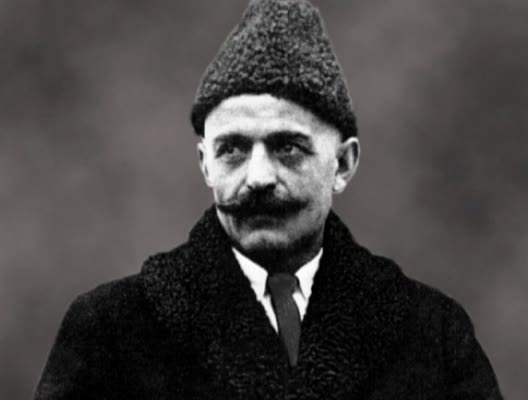ART OF AWAKENING ACCORDING TO GURDJIEFF
We live in a state of waking-sleep. ~ Gurdjieff
HUMANITY IS ASLEEP
George Ivanovich Gurdjieff was an influential early 20th century Russian mystic, philosopher, spiritual teacher, dance teacher, and composer of Armenian and Greek descent. Gurdjieff taught that most humans do not possess a unified mind-body consciousness and thus live their lives in a state of hypnotic “waking sleep,” but that it is possible to transcend to a higher state of consciousness and achieve full human potential. Gurdjieff described a method attempting to do so, calling the discipline “The Work” (indicating “work on oneself”). Gurdjieff claimed that his method for awakening one’s consciousness combines the ways of the fakir, monk and yogi, and thus referred to it as the “Fourth Way.”[1]
MOST RELIGIONS HAVE LOST TOUCH WITH THEIR ROOTS
Gurdjieff argued that many of the existing forms of religious and spiritual tradition on earth had lost connection with their original meaning and vitality and so could no longer serve humanity in the way it was originally intended. As a result, humans were failing to realize the truths of ancient teachings and were instead becoming more and more like automatons, susceptible to manipulation from outside and increasingly capable of otherwise unthinkable acts of mass destruction such as world wars and other acts of violence.[2]
HARMONIOUS DEVELOPMENT OF PERSONALITY
We are not what we take ourselves to be. Buffers keep us from seeing as we are. We have only information, no knowledge or understanding. We act mechanically, albeit as machines propelled by external and internal stimuli. We have no attention; we live in dreams and imagination, slave to our habits. ~Gurdjieff
Gurdjieff proposed a system aimed at the harmonious development of human personality. His teachings were transmitted through special Group Work,[3] intense physical labor, crafts, music, dance movements, and adventures in nature.
Gurdjieff explained that there are two primary aspects of human existence—essence and personality. Essence is what we are born with and is most intrinsic to us. Personality is what we develop or acquire over time as a social façade. Our society prizes “personality” more than “essence” because essence does not really serve society’s evolutionary agenda. After the age of 7, therefore, most of our development takes place in the realm of “personality” at the expense of “essence” while “essence” remains pretty much unripe beyond its initial natural level. It is a common experience to come across successful people whose functional personality is quite developed while their being (essence) has not progressed much beyond the adolescent level!
Gurdjieff believed that conscious work upon oneself enables us to transcend the mechanical, “acted-upon self” and rise from mere personality to self-actualizing essence.[4]
SEVEN CATEGORIES OF MEN [5]
There are seven different categories of men, according to Gurdjieff’s system. In ordinary life, we meet only the three categories: man number 1, 2, and 3: instinctive man, emotional man, and intellectual man. Higher categories (man number 4, 5, 6, and 7) can be reached only through prolonged work on oneself. In his autobiography titled Witness, John Bennett recounts Ouspensky’s explanation about these categories: “If any man aspires to transformation, he must first acquire balance and harmony of his instincts, his emotions and his thoughts. This is the first condition for right transformation.”[6] Bennett presents the following list of seven categories:
| Man number 1 = instinct man |
| Man number 2 = emotional man |
| Man number 3 = intellectual man |
| Man number 4 = transitional man |
| Man number 5 = integrated man |
| Man number 6 = conscious man |
| Man number 7 = perfected man[7] |
Figure 1: Gurdjieff: Seven Categories of Man
THREE PRIMARY CENTERS
Gurdjieff divided human personality into three primary dimensions, called “centers:” instinctive center, intellectual center, and emotional center. Each human being is born with one dominant center. Most psychological/spiritual systems primarily focus on the development of one center. This leads to fragmented, discordant development of human personality. That’s precisely where our problem lies.
In ordinary life, we come across only one of the first three types of men, either with instinctive, emotional, or intellectual dimension as dominant. Transitional man is one who has realized the fact that these centers do not work in harmony in him and wants to acquire some measure of conscious harmony among them. This requires special knowledge or teaching and a school where such knowledge can be learned and practiced. Due to much work on oneself, one acquires an integrated self in which all three centers work harmoniously and one attains permanent self-awareness. This is no ordinary achievement and requires real being-efforts. One of the key tenets of Gurdjieff’s system is that before one can move up the scale of being, one has to help people who are below move upwards. One has to give before one can receive more. This is not a practical but spiritual necessity.
Number 6 man has acquired objective-consciousness, full knowledge of his self and world around. Perfected man is the last stage at which in which one has attained self-realization, the supreme aim and purpose of human birth.
[1] Adapted from: George Gurdjieff, Wikipedia entry. Retrieved November 14, 2015: https://en.wikipedia.org/wiki/George_Gurdjieff
[2] Ibid.
[3] Gurdjieff’s teaching is called “the Work” because it requires real, internal effort that each person can make. When we apply what we know, it opens us to a new level of knowledge that Gurdjieff called, “knowledge through being.” The ideas presented in the Gurdjieff system can lead to inner transformation that can put us in touch with Timeless Reality, the goal that many great sages and seers of humanity have reached.
[4] Book review of Gary Lachman’s In Search of the miraculous: Genius in the Shadow of Gurdjieff.
[5] The male gender is used for mere convenience. The description applies to both men and women.
[6] John Bennett, Witness: The Autobiography of John G. Bennett (London: Turnstone Books, 1975), 53-54.
[7] Ibid., 54.


Recent Comments